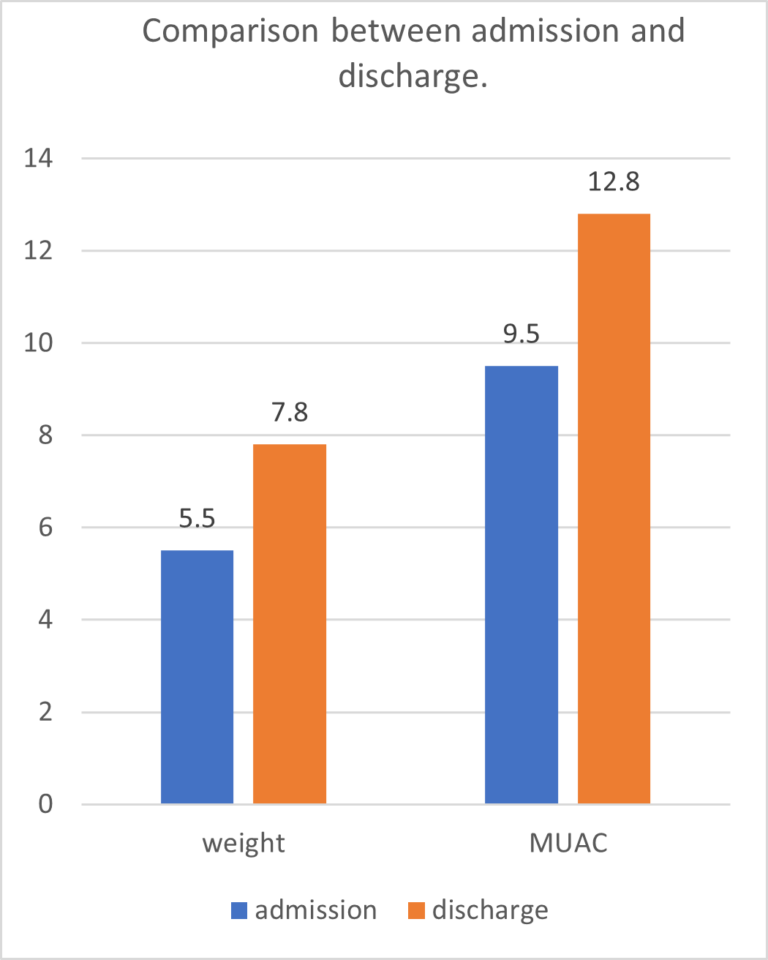FHI 360 stabilization center to the rescue in Northeast Nigeria: A case of Baby Fanne
A NE-CORE SUCCESS STORY
“I didn’t think my daughter would survive before I brought her to the FHI 360 stabilization center.”
On a rainy morning on September 4, 2023, at around 9:32 am, Fanne, a severely sick one-year-old female child, was rushed in by her mother to the FHI 360 nutrition stabilization center located in Ngala LGA, a border town with Cameroon and the Lake Chad, in Northeast Nigeria.

“I didn’t think my daughter would survive before I brought her to the FHI 360 stabilization centre,” confirmed Helumta, Fanne’s mother, who was about to lose her only child.
Ngala local government is one of the communities ravaged by the activities of non-state armed groups (NSAGs) in Borno State. The insecurity in the community has impacted the nutrition status of the population, especially children under 5 years of age. This is evident in the high rate of Severe Acute Malnutrition (SAM), as the Integrated Food Security Phase Classification (IPC) placed Ngala in Phase 4, which is regarded as an emergency phase with high rates of acute malnutrition and hunger-related fatalities. Additionally, medical complications typically increase the mortality rate among malnourished children.
Fanne is one of the children impacted by the insecurity that forced her parents to relocate to the border town of Fotokol in Cameroon, where they had to deal with food insecurity. Her mother stated: “Fanne was seriously sick for about 2 months at home before we went to the fhi360 stabilization center in Ngala. The sickness started as diarrhea. We didn’t take it seriously at first because we thought it was because of teething. However, the diarrhea persisted, which led to a drastic loss of weight. We then took her to a nearby clinic in our community but to no avail. We further involved traditional herbs and religious leaders, but to our dismay, there was no remedy. It was at the point of losing hope that we heard about the FHI 360 stabilization center in Ngala that we decided to just give it a try because we believed her condition was a spiritual one.”

In response to the high malnutrition rate and risk of death among children less than 5 years old, FHI 360, with support from USAID’s Bureau of Humanitarian Assistance has been implementing specific nutrition-specific interventions such as outpatient therapeutic program and the stabilization center for in-patient care of Severe Acute malnourished (SAM) children with medical complications in Ngala
On admission, Fanne was quickly assessed based on her history, anthropometric measurements, and vital signs. Then treatment was quickly commenced, including nutritional management based on the Nigerian national guideline for inpatient management of malnourished patients with medical complications. The mother was also catered for, as she received three meals a day with water and toiletries.
On day 13 of admission (16 September 2023), Fanne was determined clinically stable and ready to begin the consumption of the Ready-to-Use Therapeutic Feed (RUTF) adequately. Hence, she was transferred to one of the FHI 360 outpatient therapeutic programs in Gamboru, a town in Ngala L.G.A, for rehabilitation. She was further admitted into the outpatient therapeutic program on September 19, 2023, where she was assessed and given RUTF weekly. Subsequently, she reached the discharge criteria on November 21, 2023, with a weight of 7.8kg and a MUAC of 12.8 cm.


The stabilization center managed by FHI 360 is the only specialized center for the management of malnourished children with medical complications in Ngala. Since its establishment in 2017, an average of 400 patients have been admitted annually. Approximately, 503 children had received treatment at the stabilization facility by 2023. Services are delivered by a dedicated and well-trained medical team, which comprises medical doctors, nurses, cooks, and cleaners who are always present 24 hours a day to ensure that these children are adequately cared for and receive the necessary support and attention throughout their stay.
Two months after her discharge, FHI 360 Assistant Technical Officers for Nutrition (Japhet Jonah and Zira Ibrahim), accompanied by one of the FHI 360 volunteers (Umar Aminami), who works at the stabilization center and resides in the same community as Fanne’s parents, visited Fanne’s house for a follow-up visit. On reaching the house, they met Fanne happily playing in the compound with other children.
The father, in appreciation, said, “we are grateful to FHI 360 because they cared for our child 100%, and after they gave her good drugs that yielded to her recovery, they also visited my house about three times to check on my daughter. Therefore, I appreciate them very much for their efforts.”



